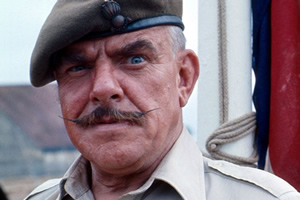
Windsor Davies
- English
- Actor
Press clippings
Windsor Davies leaves £900,000 in his will
It Ain't Half Hot Mum star Windsor Davies leaves £900,000 in will to his five children following his death at 88.
Daily Mail, 28th April 2019Mystery tribute to Windsor Davies spotted in Bridgend
A graffiti tribute to the late Welsh actor Windsor Davies has appeared on a rock face overlooking his hometown.
BBC, 21st January 2019It Ain't Half Hot Mum - where are they now?
Whatever happened to the cast of the sitcom?
Chortle, 21st January 2019Windsor Davies obituary
Windsor Davies, the actor who has died aged 88, was best known for playing Battery Sergeant Major Williams, the bigoted, beet-faced Welsh disciplinarian with the fearsome moustache bellowing "Shut up!" at such gale force intensity in the BBC television sitcom It Ain't Half Hot Mum (1974-81) that it came out as "Shaaddaap!".
The Telegraph, 20th January 2019Windsor Davies dies aged 88
Comedy actor Windsor Davies - best known for playing the sergeant major in It Ain't Half Hot Mum - has died aged 88.
British Comedy Guide, 19th January 2019Windsor Davies tribute
Windsor Davies once made me cry. And now news of his death aged 88 has brought a tear to my eye again.
Michael Hogan, The Telegraph, 19th January 2019He's an acquired taste, but there's something so dangerously odd about alleged hamster-diner Freddie Starr that makes him irresistible. He's outrageous, out of control and downright weird. The fact that he's impossible to like somehow makes him more appealing, or appalling, as this 1996 show demonstrates. There's nothing warm and fuzzy about Starr; he radiates barely suppressed anger. Yet he can be inspired and hilarious, even if you really don't want to laugh. There's plenty of madness here, though none of it is quite as hilarious as the celeb-studded audience seems to think it is, judging by the shots of shrieking Windsor Davies, Gareth Hunt and Carol Smillie. As a comedy museum piece, though, it's worth a look.
Alison Graham, Radio Times, 26th June 2010Tribute is paid to a very different form of entertainment in Comedy Songs: The Pop Years. But what exactly, one of the first questions asks, is a comedy song?
"A song that makes you laugh," suggests Victoria Wood. She should know, having sung dozens in her breakthrough TV gig on consumer show, That's Life.
She's an original whose song, Let's Do It Again, is described as a mix of George Gershwin and Alan Bennett, as she celebrates "the absurdity of the mundane".
Who cannot warm to a song whose lyrics include the lines "Bend me over backwards on me Hostess trolley" and "Beat me on the bottom with a Woman's Weekly"? Eat your heart out, Andrew Lloyd Webber.
The history of comedy songs reflects the changing voice of comedy in general, from music hall songs, to Peter Kay's recent number one, as Geraldine with The Winner's Song.
Writer David Quantick traces the origins of the comedy song back to "some pillock in a jester's hat with a lute, singing about his genitals to the king, making it up as he went along".
One thing about comedy songs is that they may be irritating, but you can't stop singing them. The skiffle era gave birth to such memorable ditties as Does Your Chewing Gum Lose Its Flavour On The Bedpost Overnight? What sort of mind comes up with a lyric like that?
The birth of the singles chart in the early 1950s meant that comedy songs could make money. The Barron Knights and The Goons had hits. There were topical songs at the start of TV's That Was The Week That Was, and Benny Hill sang about Ernie, who drove the fastest milkcart in the west.
Many songs came from TV shows like The Two Ronnies, The Goodies (doing the funky gibbon) and It Ain't Half Hot Mum duo Don Estelle and Windsor Davies duetting on Whispering Grass.
Comedy songs gave hits to people who wouldn't normally expect to make the charts. Barry Cryer recalls having a number one in Finland 50 years ago with a cover version of Purple People Eater - which, on reflection, sounds like something you might find in Crooked House.
Steve Pratt, The Northern Echo, 22nd December 2008Never The Twain ran for ten years on ITV. Ten years! Donald Sinden and Windsor Davies were two rival antique dealers, continually trying to get the better of each other. A sample of the writing? "I started at the bottom, you need brains there." The punchline? "Well, your brains are in your bottom." This drivel ended in 1991.
Lorna Cooper, MSN Entertainment, 12th August 2008This pain-wracked (I hope) pair write "Dad's Army" (BBC1) and "It Ain't Half Hot, Mum" (BBC1) which is about the misadventures of an army concert party in India is, I think, funnier. I particularly recommend the performance of Windsor Davies as the Sergeant Major.
Nancy Banks-Smith, The Guardian, 4th January 1974